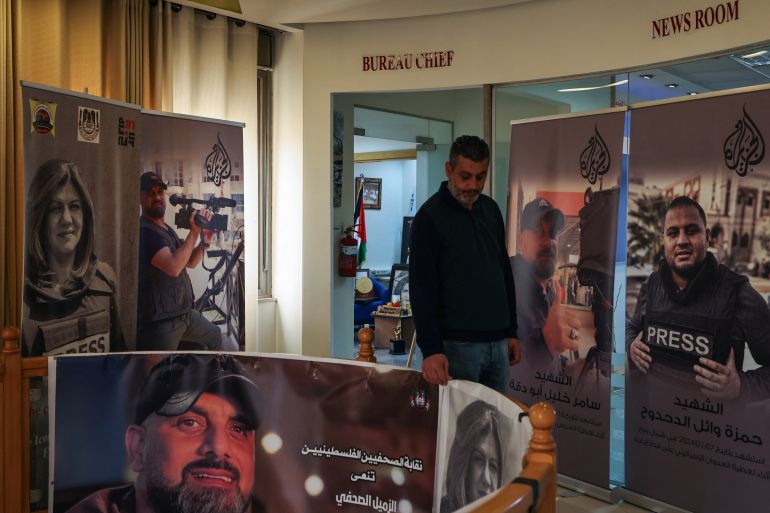Israeli soldiers raid, order closure of Al Jazeera office in Ramallah
Heavily armed and masked Israeli soldiers raid Al Jazeera bureau in occupied West Bank and deliver 45-day closure order.
The Al Jazeera network offices in Ramallah in the occupied West Bank on May 5, 2024 [Zain Jaafar/AFP]By Al Jazeera StaffPublished On 22 Sep 202422 Sep 2024
Israeli forces have raided Al Jazeera’s offices in Ramallah in the occupied West Bank and imposed a 45-day closure, in the latest push to curtail the news network’s coverage.
Heavily armed and masked Israeli soldiers entered the building and handed the closure order to the network’s West Bank bureau chief Walid al-Omari early on Sunday. They did not provide a reason for the decision.
“There is a court ruling for closing down Al Jazeera for 45 days,” a soldier told al-Omari as Al Jazeera Arabic broadcast the conversation live on television.
“I ask you to take all the cameras and leave the office at this moment,” the soldier said in Arabic.
Sunday’s raid comes just months after the Israeli government banned Al Jazeera from operating inside Israel in May.
That initial closure order was also for 45 days, but it has been renewed and Al Jazeera journalists are still unable to report from inside the country.
Speaking over the phone from Ramallah on Sunday, Al Jazeera’s correspondent Nida Ibrahim said the West Bank raid and closure order “comes as no surprise” after the earlier ban on reporting from inside Israel.
“We’ve heard Israeli officials threatening to close down the bureau. We’ve heard the government discussing this, asking the military ruler in the occupied West Bank to close down and shut down the channel. But we [had] not been expecting it to happen today,” Ibrahim said.
The Gaza Government Media Office called the Israeli decision on Sunday a “deafening scandal”.
“We call on all media organisation and groups that deal with human rights in the world to condemn this heinous crime … that is a blatant violation of press and media freedom,” it said.
Media rights groups have slammed the Israeli government for its restrictions and attacks on journalists, particularly Palestinian reporters on the ground in Gaza amid the ongoing war.
Since the start of the war in October of last year, Israeli forces have killed 173 journalists, according to a tally from the Gaza Government Media Office. That includes Al Jazeera’s Ismail al-Ghoul and Samer Abudaqa.
Al Jazeera Arabic correspondent Ismail Abu Omar was also severely injured in an Israeli strike in February.
Attacks against Al Jazeera reporters predate the war in Gaza, however.
In 2022, Israeli forces killed veteran Al Jazeera correspondent Shireen Abu Akleh while she was reporting from Jenin in the occupied West Bank.
A year earlier, the Israeli military also bombed a tower housing the network’s offices in Gaza.
Al Jazeera condemned the ban on reporting inside Israel earlier this year, calling it a “criminal act that violates human rights and the basic right to access of information”.
“Israel’s ongoing suppression of the free press, seen as an effort to conceal its actions in the Gaza Strip, stands in contravention of international and humanitarian law,” the network said in a statement in May.
“Israel’s direct targeting and killing of journalists, arrests, intimidation and threats will not deter Al Jazeera from its commitment to cover.”
Sunday’s raid highlights Israel’s tight control over the occupied West Bank, including areas purported to be under Palestinian Authority jurisdiction such as Ramallah.
It comes two days after the United Nations General Assembly voted overwhelmingly for an end to the Israeli occupation.
Rami Khouri, a fellow at the American University of Beirut, also said the raid is part of a longstanding Israeli policy of seeking to “prevent real news about Palestinians or about what the State of Israel is doing to Palestinians” from coming out.
But Khouri told Al Jazeera that the Al Jazeera bureau’s closure won’t “stop the world from knowing what’s going on, because of the hundreds of brave Palestinian journalists” and other foreign journalists in the West Bank and in Israel.
